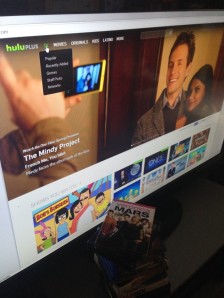Binge watching is a new practice that has changed how we watch TV. In the past viewers would watch one episode a week of their favorite shows. Today viewers watch several episodes in one sitting streaming from the Internet.
“One key to understanding the addictive nature of television is the on-demand feature,” according to a recent report from Rutgers University titled “Binge Watching, an Overlooked Type of Television Addiction”.
“Viewers can now access episodes of most television series from nearly every multimedia device at any time, with the likes of Netflix, HBO Go and Amazon Prime. As a result of this easy access, more viewers are beginning to binge watch several episodes, one right after the other,” the report stated.
Harris Interactive, which collects and provides analysis on consumer behavior as part of Nielsen Company, conducted a survey Dec. 13, 2013 on behalf of Netflix that found 73 percent of participants in the study defined binge watching as, “Watching between two to six episodes of the same TV show in one sitting.”
“Binge watching is actually an interesting phenomenon in programming because it lets the viewer completely immerse without ads,” said Michele Fogg, professor of journalism and media studies at the College of Southern Nevada. She mentioned how in the past channel surfing was not that enjoyable for many viewers; whereas now viewers can pick specific shows and watch them consecutively making it more enjoyable and convenient.
Harold Griffin, CSN student who binge watches, said, “Binge watching is a reward of sorts for a bogged down person.” He rewards himself by sitting down to his favorite show for hours. He also brought up an interesting point about how binge watching changes the suspense of a show. The effect of cliff hangers at the end of episodes was meant to get the viewing audience to tune in next week. Creators hoped its fans would think about it all week. Now viewers can go right into the next episode and just find out what happened.
Binge watching has many pros but it also has some cons.
In a study published by “The Journal of the American Medical Association” on June 15, 2011 by Frank Hu, professor of nutrition and epidemiology at Harvard School of Public Health, it was reported that, “Longer duration of TV viewing time was associated with an increased risk of fatal or nonfatal cardiovascular disease.” In other words, the more TV people watch the more at risk they are for heart issues.
Another report states similar findings.
“There’s convincing evidence in adults that the more television people watch, the more likely they are to gain weight or become overweight or obese,” according to a report called “Binge Watching: TV May Be Harmful to Health” from Harvard School of Public Health. “There’s emerging evidence that too much TV watching also increases the risk of weight-related chronic diseases, such as type 2 diabetes.”




